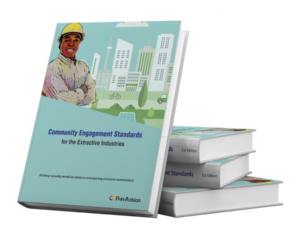 For decades, Corporate Social Responsibility (CSR) in Nigeria has largely been driven by philanthropy, ad hoc interventions, and crisis response rather than structured, sustainable engagement. And yet many businesses operating in high-impact sectors such as oil and gas, mining, and manufacturing have found themselves caught in endless cycles of community conflict, distrust, and reputational damage.
For decades, Corporate Social Responsibility (CSR) in Nigeria has largely been driven by philanthropy, ad hoc interventions, and crisis response rather than structured, sustainable engagement. And yet many businesses operating in high-impact sectors such as oil and gas, mining, and manufacturing have found themselves caught in endless cycles of community conflict, distrust, and reputational damage.
As a sustainability-driven organisation, we recognised this gap several years ago and painstakingly developed the Community Engagement Standards (CES)—a framework that provides businesses with a structured, inclusive, and transparent approach to engaging host communities. The CES was endorsed by the Nigerian Ministry of Petroleum Resources and its agencies in 2019, making it a critical tool for companies operating in the extractive industries.
In this article, we explore why structured community engagement is not just a regulatory requirement but a business imperative—one that saves costs, mitigates risks, and fosters long-term, mutually beneficial partnerships between corporations and communities.
The Problem: Why Traditional CSR Models Have Failed
Corporate engagements with most host communities in Nigeria have often been reactive rather than proactive. When conflicts arise—whether due to resource exploitation, environmental concerns, or unmet promises—businesses rush in with temporary fixes such as compensation payments, quick infrastructure projects, or last-minute negotiations.
However, this approach has consistently failed due to:
- Lack of Transparency: Communities often feel excluded from decision-making processes, leading to mistrust and opposition.
- Poor Stakeholder Management: Many businesses engage only with a select few local leaders, leaving out key groups such as women, youth, and small-scale entrepreneurs who are also affected by corporate activities.
- Short-Term Interventions: Instead of long-term, sustainable projects, many CSR initiatives are one-off efforts that do not create lasting impact.
- Inconsistent Policies Across Companies: Different organisations have varied approaches to community engagement, making it difficult to standardise expectations and best practices.
The CES framework by CSR-in-Action was developed to address these challenges, ensuring that community engagement is systematic, transparent, and participatory rather than arbitrary and crisis-driven.
The Community Engagement Standards (CES): A Game-Changer
The CES framework is a multi-stakeholder approach that guides businesses in engaging host communities fairly, transparently, and sustainably. The framework:
- Defines clear guidelines for corporate-community relations, ensuring all voices are heard.
- Emphasises inclusivity, ensuring that women, youth, and vulnerable groups are part of decision-making processes.
- Sets up conflict prevention mechanisms, reducing the likelihood of protests, shutdowns, and legal disputes.
- Aligns corporate efforts with local development goals, ensuring that CSR initiatives are mutually beneficial.
One of the key aspects of the CES is the establishment of Community Development Agreements (CDAs), where businesses and communities agree on:
- Project selection and implementation processes
- Revenue-sharing models
- Accountability measures to ensure transparency in project execution
This structured approach reduces corporate-community tensions, fosters trust, and ensures that development projects align with actual community needs.
Regulatory Alignment: Why CES is Critical for Business Compliance
With the passage of the Petroleum Industry Act (PIA) in 2021, companies operating in the oil and gas sector are now legally required to:
- Contribute 3% of their annual operating expenses to Host Community Development Trusts (HCDTs).
- Ensure transparent fund management in collaboration with community representatives.
- Integrate social and environmental considerations into business operations.
The CES framework aligns with the PIA, making it an essential tool for companies seeking compliance with Nigeria’s new sustainability laws.
Furthermore, global sustainability reporting standards such as the Global Reporting Initiative (GRI) and ISSB emphasise the importance of stakeholder engagement and social impact reporting. CSR-in-Action has worked with businesses across Nigeria to align their ESG reporting with these international frameworks, ensuring that their sustainability efforts are both credible and impactful.
The Way Forward: Strengthening Corporate-Community Partnerships
To build stronger, more resilient business-community relationships, Nigerian companies must:
- Adopt structured engagement frameworks like CES, rather than relying on informal, crisis-driven interventions.
- Move beyond philanthropy to long-term development partnerships.
- Ensure compliance with the PIA and international ESG standards to attract investors, partners, and government support.
- Train internal teams on effective stakeholder engagement, ensuring that community relations officers understand best practices in conflict resolution and participatory development.
At CSR-in-Action, we are committed to helping businesses navigate the complexities of community engagement, ensuring that their sustainability efforts lead to measurable impact, reduced conflict, and enhanced corporate reputation.
Is your organisation ready to build lasting partnerships with host communities? Let CSR-in-Action guide you through structured, impactful, and compliant community engagement strategies.
References
【1】 CSR-in-Action’s Community Engagement Standards (CES) Endorsement – https://www.sitei.org/ces
【2】 CES Framework Overview – https://www.csr-in-action.com/community-engagement-standards

